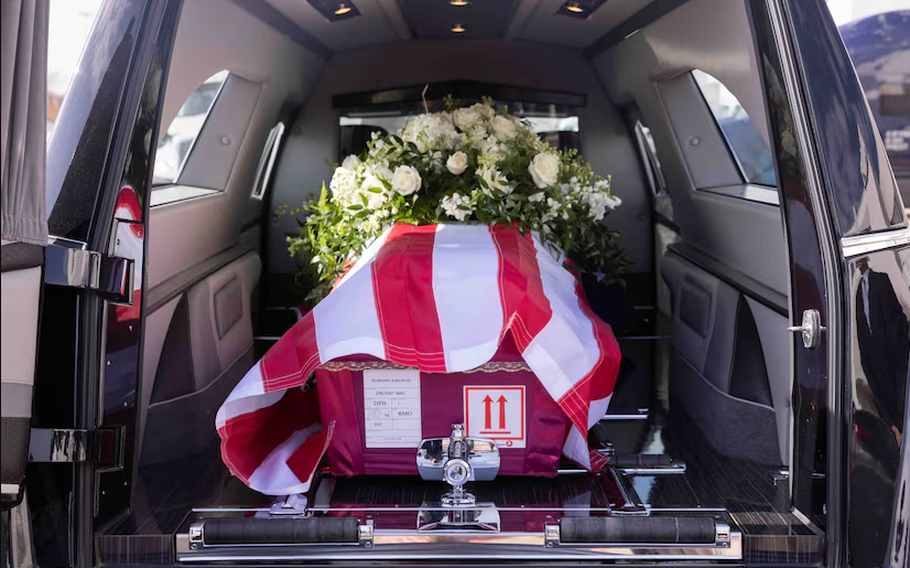
The casket of Cedric Charlie Hamm, U.S. Army veteran and Texas native killed fighting for Ukraine, is loaded into the hearse at Dallas Fort Worth International Airport on Tuesday, Dec. 17, 2024. The R.T. Weatherman Foundation helped repatriate Hamm’s body. (Juan Figueroa/The Dallas Morning News)
GRAPEVINE, Texas (Tribune News Service) — The phone call came in early April this year from the U.S. embassy in Kyiv. At 1 in the morning in Texas, Raquel Hamm steeled herself for the news she had dreaded since her son enlisted as a U.S. Army Ranger eight years earlier.
Cedric “Charlie” Hamm was 26 years old and brave, the oldest of four kids who grew up in South Texas. He was the grandson of a U.S. Marine and believed in freedom and democracy so much that he wanted to fight from the front lines, his relatives said.
“He was a protector,” Raquel Hamm said. “He could not let people in need suffer.”
Eight months after completing his Army service, including a stint in Afghanistan, Hamm was contemplating his next steps when he realized what he had to do.
Images and stories from Ukraine haunted him. Cities under siege and hospitals bombed. Desperate women and children fleeing. As a staff sergeant in the Army Rangers, Hamm told his family he had the skills to help train Ukrainian soldiers thrust into the war with Russia.
In January 2024, Hamm said goodbye to his family and to his rescue mut, Rusty, and flew to Ukraine.
Three months later came the call from the embassy. Her son was missing in action. Raquel Hamm knew right away. He was gone.
It’s not known how many Texans or even Americans are fighting alongside Ukrainian soldiers, although officials there said in 2022 that 20,000 foreign nationals from 52 countries joined Ukrainian forces. Like Hamm, the soldiers are drawn to the mission: to help free a country and its people.
When Hamm arrived in Ukraine, his mother said, he knew his plans to only train soldiers were insufficient. Ukraine needed more fighters, and Hamm could not resist duty. He joined a brigade comprised largely of foreign nationals and traveled to Sumy Oblast in the northeastern part of the country along the Russian border.
In March of this year, the brigade came under heavy gunfire. Hamm’s whereabouts were unknown.
Shortly after Hamm went missing, his case was sent to the R.T. Weatherman Foundation, a nonprofit that delivers humanitarian aid and works to bring home the remains of soldiers killed in combat in Ukraine.
Director of program management Lauren Guillaume, who is originally from Austin and is now stationed in the Ukrainian capital of Kyiv, felt an instant connection with Hamm, a fellow Texan.
Since Russia invaded Ukraine in 2022, the foundation has repatriated the bodies of nine soldiers from around the world, seven of which were Americans. The work is difficult, time-consuming and often heart-wrenching.
Families who lose loved ones across the world are left with countless questions and no closure, Guillaume said.
The foundation serves as a sort of liaison between the families and Ukraine. It attempts to locate their remains through detailed investigations, piece together their last moments, and apply for death certificates and payment. (Families of foreign nationals killed in Ukraine are entitled to about $400,000 from the Ukrainian government, Guillaume said, but the payments require paperwork.)
The Weatherman foundation ultimately works to return bodies of fallen soldiers to their families.
“They died fighting for the ideals we live by,” Guillaume said. “Our duty is to not give up. We owe it to them and their families.”
In Hamm’s case, the foundation spoke with soldiers who survived the attack, but Guillaume said the investigation stalled with little information. Defeated, the Hamm family decided to gather in June for a celebration of life.
They ate Hamm’s favorite Mexican street tacos and talked about his bravery but also his gentleness, like the time he found a rail-thin dog on the street, nursed him to health and fell in love and named him Rusty.
In Ukraine, Guillaume and her team were still searching for Hamm. Investigators with the foundation received a tip that led them to a morgue. A week later, they found Hamm, identified by his American flag tattoos and a DNA match from a sample provided by his mother.
Guillaume called Raquel Hamm in October. “We found him,” she told the fallen soldier’s mother.
“It’s a miracle,” Raquel Hamm later said. “It’s almost unbelievable. We had given up hope.”
The foundation sent home a box of his belongings: a winter coat, clothing, passport, socks, phone, sleeping bag. Everything but his toothbrush, his mother joked. When it arrived, she brought his coat to her face and inhaled his scent, mixed with smoke from the fires built to stay warm with the country’s energy grid under attack.
One day, she plans to turn these clothes into teddy bears for her future grandchildren, so they will have a piece of their uncle.
Seven months after he went missing, Guillaume returned to Texas this week with Hamm’s flag-draped coffin after a multiday journey from Ukraine to Moldova to Istanbul to Dallas.
Outside DFW International Airport on Tuesday, Hamm’s extended family waited near a hearse that would take him to Lucas Funeral Home in Grapevine, where he will be cremated. The family has not yet decided what it will do with his remains.
As his coffin appeared, Raquel Hamm wiped tears from her eyes and stepped forward. Her son was home.
©2024 The Dallas Morning News.
Visit dallasnews.com.
Distributed by Tribune Content Agency, LLC.